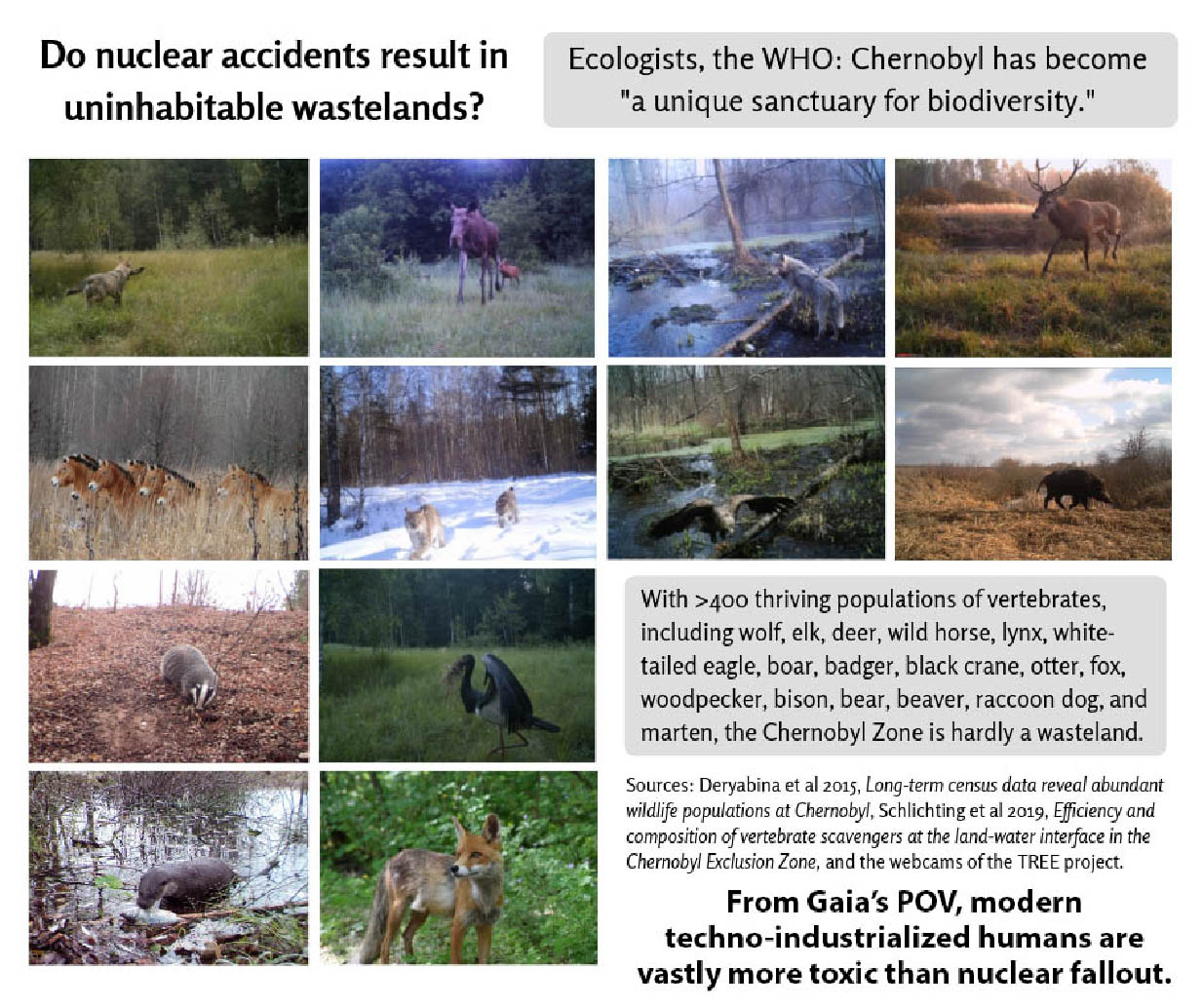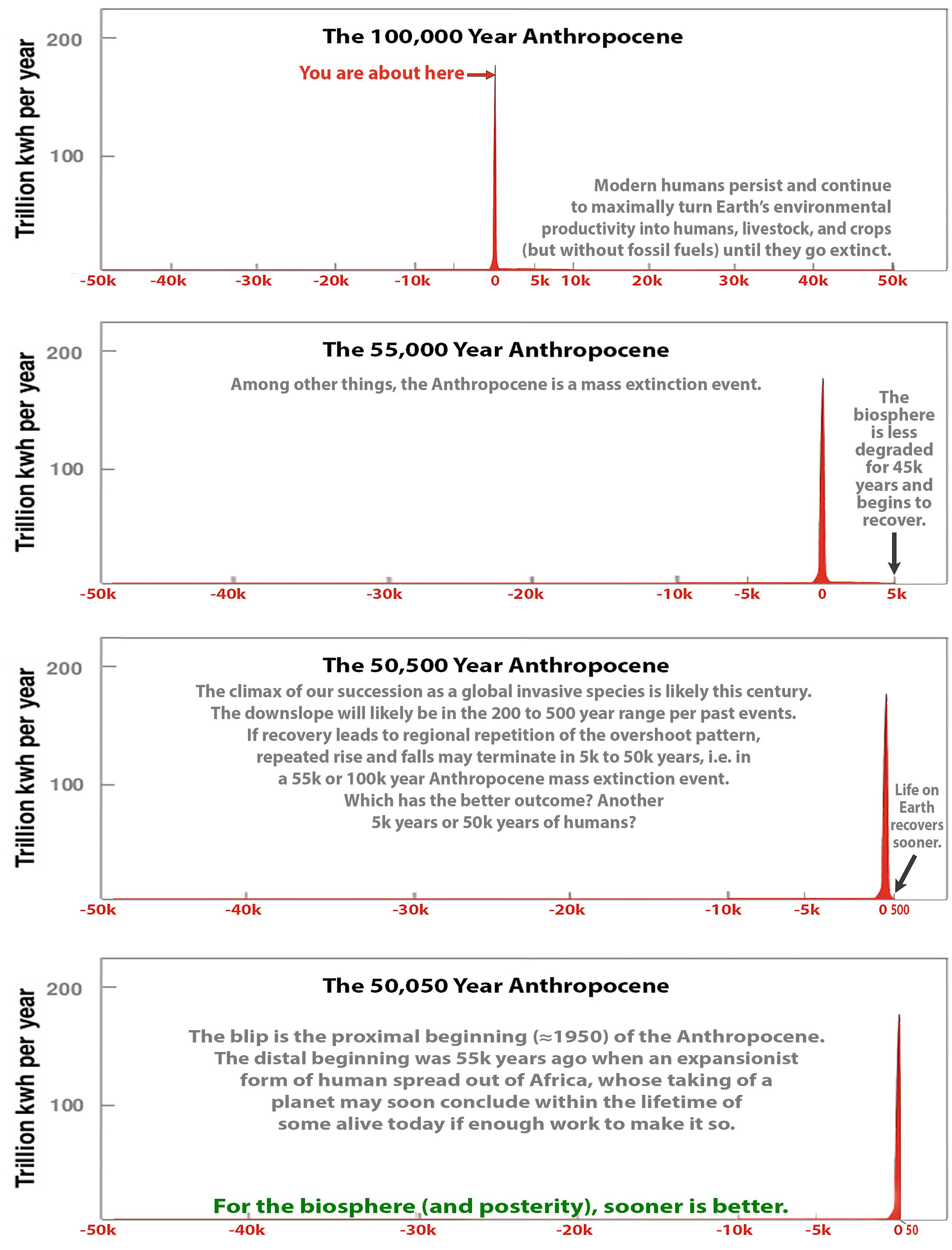
TUESDAY, JAN 31, 2023: NOTE TO FILE

When Did the Anthropocene Begin?
Pick a number between 1970 CE and 75k BP
Anthropocene: n. the period during which human activity has been the dominant influence on climate and the environment, e.g. "some geologists argue that the Anthropocene began with the Industrial Revolution." Actually, the Anthropocene is a systems phenomena. There can be no moment of beginning. There are proximal and distal origins. If humans had not mutated into an expansionist form of human about 75kk years ago, the Great Acceleration of about 1950 would not have happened (nor would have the Anthropocene mass extinction event). A cancer doesn't begin (other than subjectively) when diagnosised. It's proximal beginning is when the first cell goes metastaic to become 2, 4, 8, 16....
Eric Lee, A-SOCIATED PRESS
Abstract: We humans live in the Quaternary Period which began only 2.58 Ma (million years ago) that began with the glaciation of North America. It comprises the Pleistocene (2.58 Ma, to 11,700 BP, Before Present=1950 CE) and Holocene (c. 9750 BCE to present) epochs and is the third period (despite name) of the Cenozoic Era (66 Ma to present) of the Phanerozoic Eon (539 Ma to the time you are reading this). And the Age of Man began...
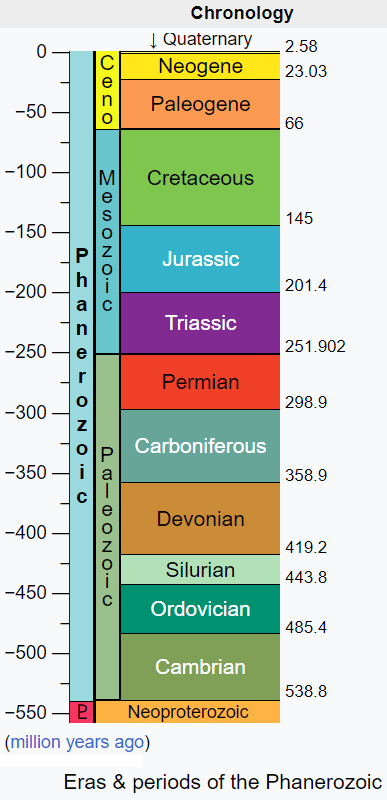 COOS BAY (A-P) — Since we live in the Quaternary Period and we (the 99.9+%) agree that humans should have a period named after us, we should have just renamed the Quaternary Period the Anthropogene Period.
COOS BAY (A-P) — Since we live in the Quaternary Period and we (the 99.9+%) agree that humans should have a period named after us, we should have just renamed the Quaternary Period the Anthropogene Period.
But Soviet scientists didn't get the memo that humans should have a period named after them (or era or eon and call it the Anthropozoic). They were the trouble makers who first used the term 'Anthropocene' in the 1960s, which spread globally in the 1980s. But the '-cene' implies that humans just get a mere epoch named after them, which violates a well-known law of the universe.
So, if we could just agree to a name change, the Anthropogene began 2.58 million BP when hominins started leaving stone tools everywhere (2.6 Ma in parts of Africa). But consensus narratives tend to get messy, people like using the word 'Anthropocene', and mere opinions multiply.
The Holocene Epoch didn't start when our species appeared, so a name change doesn't work if you want an earlier date, and since we moderns don't count our beginnings from 350k to 400k BP (archaeogenetic data best guess), we have to pick a moment in time between now and then that denotes the beginnings of us moderns, we Anthropocene enthusiasts.
Our enthusiasm came well before atomic bombs or even plastics. The Industrial Revolution was a shot in the arm of undiluted hubris, but the Romans were a wood, wind, and agriculture empowered industrial society who were notably enthusiastic empire builders too, maybe even more than Americans. And our Indo-European language spreaders and cultures (agrarian form of civilization) enthusiastically took their domesticated cattle (and cattle drawn plows) from the northern edge of the formerly Fertile Crescent (Anatolia about 9k BP) to the steppes of Eurasia (about 7K BP) to add large wheeled-cart technology to haul all the stuff they acquired as they expanded in vast areas formerly taken by expansionist Man the Hunter.
When our expansionist ancestors went out of Africa, some went east to Australia and north to cross the Bering Strait into the Americas, and others went north to Europe and eventually sailed across the Atlantic to meet up with their fellow expansionists in Newfoundland about 1021 CE (so says tree ring data). About 500 years ago they met their fellow Austronesian expansionists (who took the Pacific Islands starting about 4k BP) in Zealandia, the last continent taken (and the last major megafauna extinction event).
So when did human activity begin to dominate Earth's (Gaia's) climate and the environment? The idée fixe of climate change is a recent distraction that will pass, so focus on the environment (biosphere) of which climate is a subsystem. When did modern humans begin to dominate planetary biomes as an invasive species? When did our current one-off, plague-phase taking of a planet begin regionally? When did the Anthropocene mass extinction event begin and when will it climax?
Geologists want to make life easy for future geologists (e.g. those from the planet Omicron when they pass by) and find a clear marker that will be found in geological strata millions to billions of years from now. So, easy, the Anthropocene starts about mid-twentieth century (i.e. about 1950 with the Great Acceleration). Find the layer of radionuclides and microplastics. Below is the Cenozoic. Above is the Anthropozoic Era, starting with the Anthropogene Period and Anthropocene Epoch.
Humans will get what they long for, momentous achievement and notoriety. We will go down in Galactic History as the source of the ninth mass extinction event, named after us of course, the one that made the Permian mass extinction event look like a pretend mass extinction.
So, humans (the modern form of), get your story straight. You are an expansionist form of human that arose in Africa to then go out of Africa 50k to 60k years ago within a small population of normal K-strategist humans who were living (sustainably) within environmental productivity, as all other hominins had for over 6 million years, and their K-strategist ancestors had since the beginnings of the Phanerozoic (the ones who were good enough K-strategists to persist as evolvable forms of life on Earth).
Modern humans may point out that their expansionism is normal, is found in nature, is natural, is what superior forms of life do (to maximize power). But those who tell this true story will likely omit that, as the epochs pass, species who play the one-off, plague-phase game always prosper for a time, i.e. are selected for, but typically not long term as evidenced by their extinction (enthusiastic short-term self interest, e.g. metastatic cancer, is not selected for long term).
Of course there are exceptions that modern humans might hope to emulate. Locust (extreme r-strategists) are one of the few species that make overshooting carrying capacity work for them as an evolving species (by sidestepping extinction at the end of the downslope). During the plague phase they undergo radical behavioral and morphological changes that are adaptive, i.e. allow some to pass on their genes to the next generation who live within limits like everybody else for a decade or so, then when the local environment has recovered enough from their prior devastation, they repeat the pattern again.
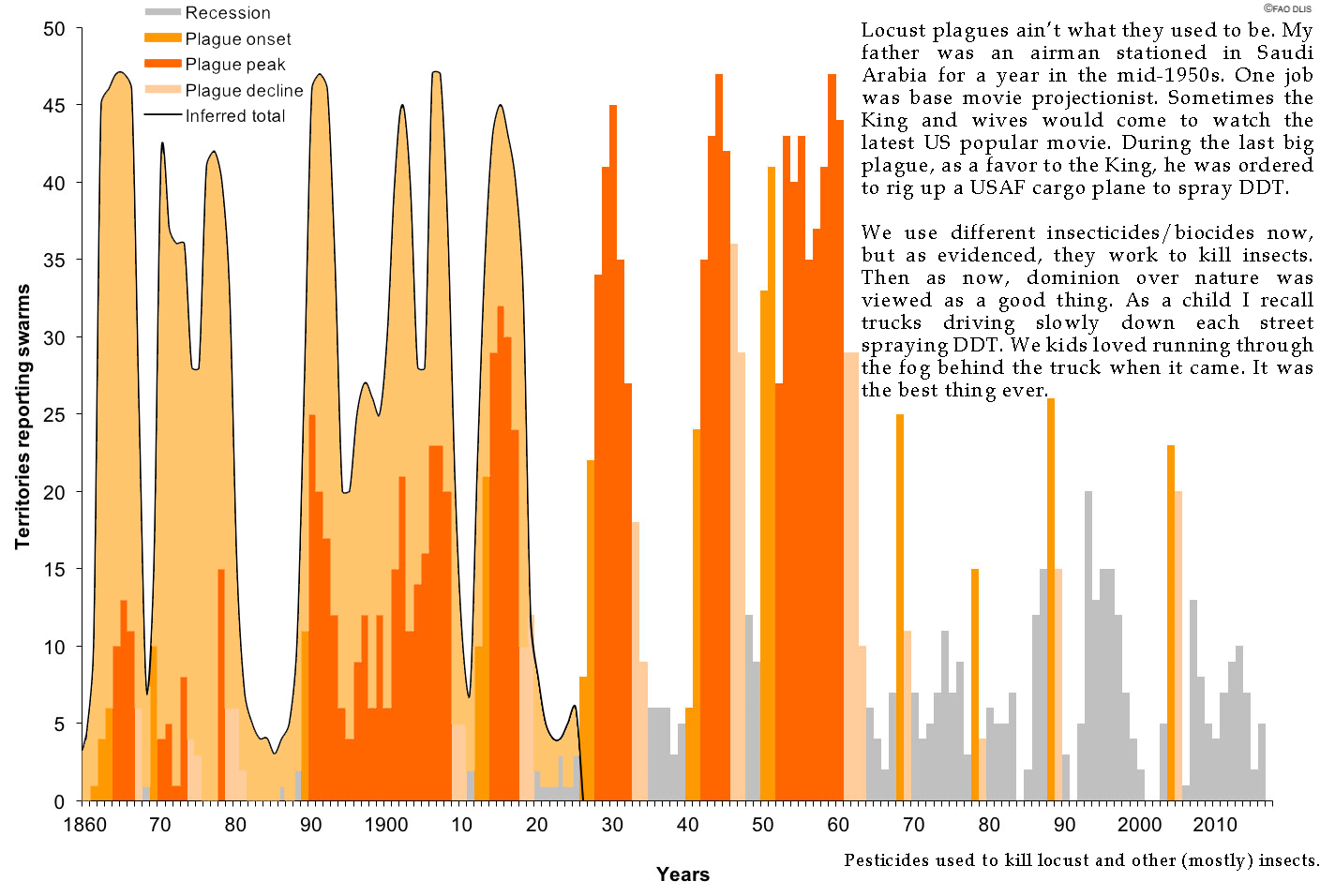
Modern humans have only been overshooting the carrying capacity of their habitat regionally for 50k or so years. Doing so works (for a time). Growth, expansion, is the best thing ever (until it isn't). Those doing it prosper greatly, but only if there is more habitat just beyond the horizon for the taking. For 50k years there has been.
But the message the crew of spaceship Earth should consider sending out now is, '"Houston, the planet has been taken. Now what? Some think we have a problem, but what problem?" Brief pause. "Okay, thanks Houston, I'll have Joey read the operating manual. It should be around here somewhere."'
Within regions already taken by Man the Hunter expansionists, agrarian expansionists spread out of the formerly Fertile Crescent. Some, with crops and goats, went south to the Levant and on back to Africa, a continent for the taking (by displacing prior Man the Hunter expansionists).
Others, notably our ancestors (cultural or genetic) who of course merit a repeat mention, had domesticated cattle and took them and some crops north to the steppes of Eurasia, another continent for the taking (from prior Man the Hunter expansionists) as agrarianism supports much larger populations easily able to 'displace' (kill the males and breed the females, especially after metallurgy and horses are added about 5k BP) the prior population of expansionists who had 'displaced' the prior non-expansionist forms of Homo sapiens and other hominins).
So will the radical behavioral and morphological changes we ultra moderns are undergoing allow us to sidestep extinction? Think of the answer (Nature has all the answers, so this is Gaia speaking) as a 2x4 upside blindered heads that don't know enough to have an opinion. And the word, full STOP, is NO.
We ultra moderns are humans of NIMH different from viable forms of human as Calhoun's domesticated lab rats and mice were different from the wild Norway K-strategist rats (i.e. normal rats) of his first experiment.
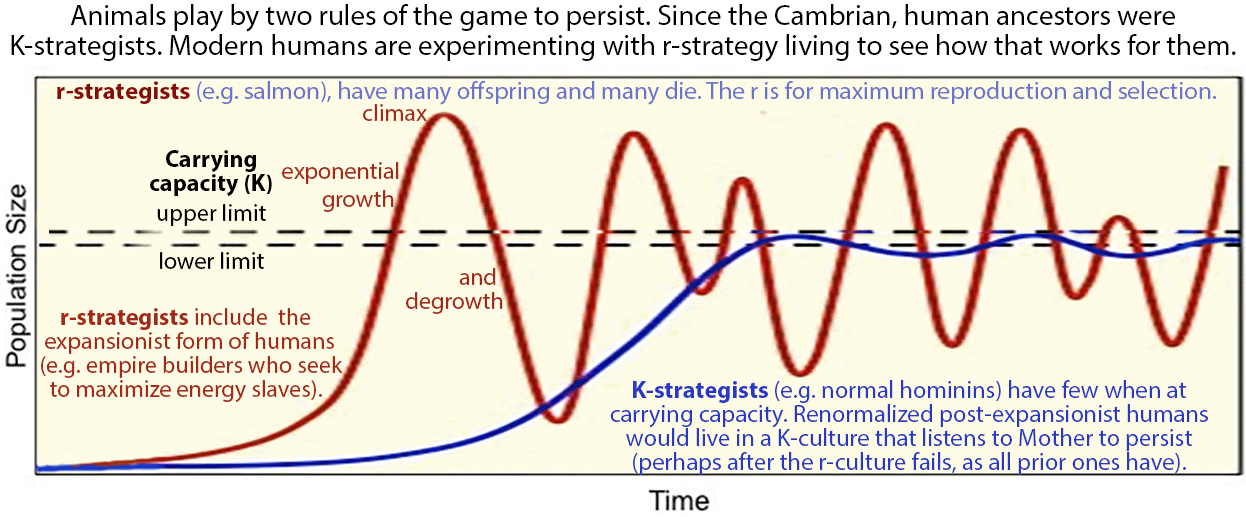
Locusts have evolved as the epochs passed to pull off their plague-phase overshoot AND RECOVERY trick. We expansionist form of human as Man the Hunter merely achieved a few hundred megafauna extinctions (including all other hominins except for the remnant San, Hadza, and Pygmy K-strategist form of human), but that is perhaps not enough to name an epoch after, though the absence of megafauna marker fossils is enough.
But the concept of 'beginning' is slithery, is a concept that like all other concepts isn't out there. We construct stories that are not true, are not the thing conceived. I have a birthday that is probably correct to the day, but asking 'when did "I" begin?' is an invitation to tell a story. As a phenotypic expression of my unique genotype, it is obvious that 'I' began during the 24 hour PROCESS of fertilization (there is no moment of conception) when a particular sperm penetrated an egg cell that formed within my mother when she was inside my grandmother (the egg being half me, but not me), then my other half progressively joined up with his better half (the one not missing a chromosome) to climax in the first mitotic division that became me. Oh, and as I see no evidence that I have a right to life now, I see less that I had such a right as a blastula.
This is my phenotype's story. And my form-of-human story goes back 55k years (I'll round off) for the archaeogenetic data tells me so (and anyone else able to listen). As for my story about the future, no details are knowable and serve only as distractions if imagined (in any detail). If I shoot an arrow at the noonday sun, I don't know exactly where and when it will climax in its trajectory and descend, but asking whether it will come down or not becomes a 'how could it not?' question that is another distraction. Our 55k year expansion within and out of Africa will end, likely this century (how could it not?), or if not, add a century, as in 50k years from now the foreseeable story will be the same. Of course no true believer can see past their image of the world and its future.

 We humans are nearing the climax of our succession as a now global invasive species having no evolved adaptation to overshoot and recovery. Regionally, some empires collapsed to then recover (about 20% eventually recover if not conquered/subsumed by an outlaying empire on the rise), but repeat this pattern long enough (5k to 50k years?), and extinction is the outcome as usual (no K-strategist has been able to play the overshoot game and win in the last 500 million years, so modern humans are betting their lives they will be the first).
We humans are nearing the climax of our succession as a now global invasive species having no evolved adaptation to overshoot and recovery. Regionally, some empires collapsed to then recover (about 20% eventually recover if not conquered/subsumed by an outlaying empire on the rise), but repeat this pattern long enough (5k to 50k years?), and extinction is the outcome as usual (no K-strategist has been able to play the overshoot game and win in the last 500 million years, so modern humans are betting their lives they will be the first).
Will humans adapt as locusts have to 'take' the planet every few centuries as the epochs go by after there has been enough environmental recovery to allow another pulsing? Or maybe we humans of NIMH should endeavor to renormalize, and for the sake of posterity and the biosphere, sooner may be better as any delay may mean that renormalizing on the downslope will not be at all possible.
If in the year 1,000,1950 CE (our time) an Omicron exobiologist and paleobiologist happens by, a few missing megafauna fossils won't be obvious, but that the process of expansion unto global overshoot started with the first expansionist who looked beyond the horizon, saw habitat for the taking, AND successfully took it (e.g. killed the males and bred the females), had a beginning that selected for an ending would be the beginning of the Omicron story of Us.
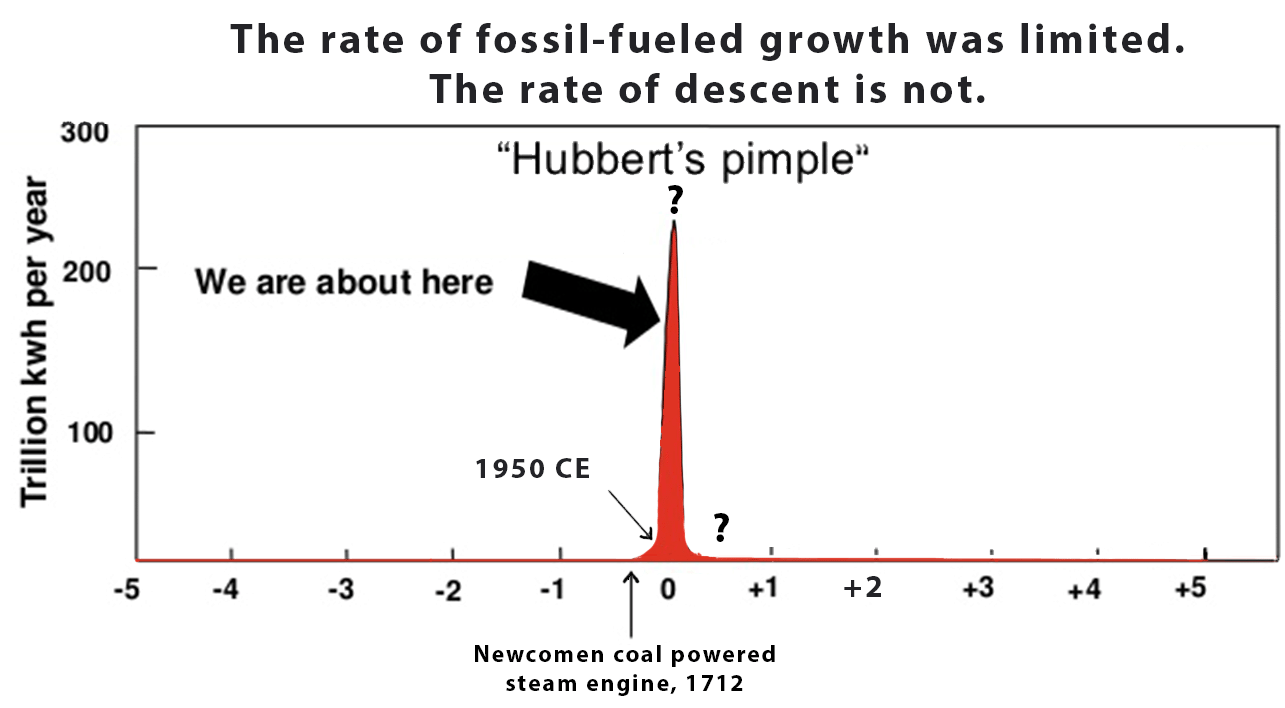
Future as depicted ends in human extinction after 5k years, 200 generations, on the downslope.
Post climax, the dynamic of descent may be remorseless in selecting for dissolution.
A layer of artifacts, including elevated radionuclides and microplastics, will be obvious. The layer will clearly mark the fossil fueled pulse of a species in planetary overshoot, as will the absence of most (or all) vertebrate fossils above the layer. We are privileged (we all know we are) to live in interesting times of our own making. Welcome to the Anthropocene.
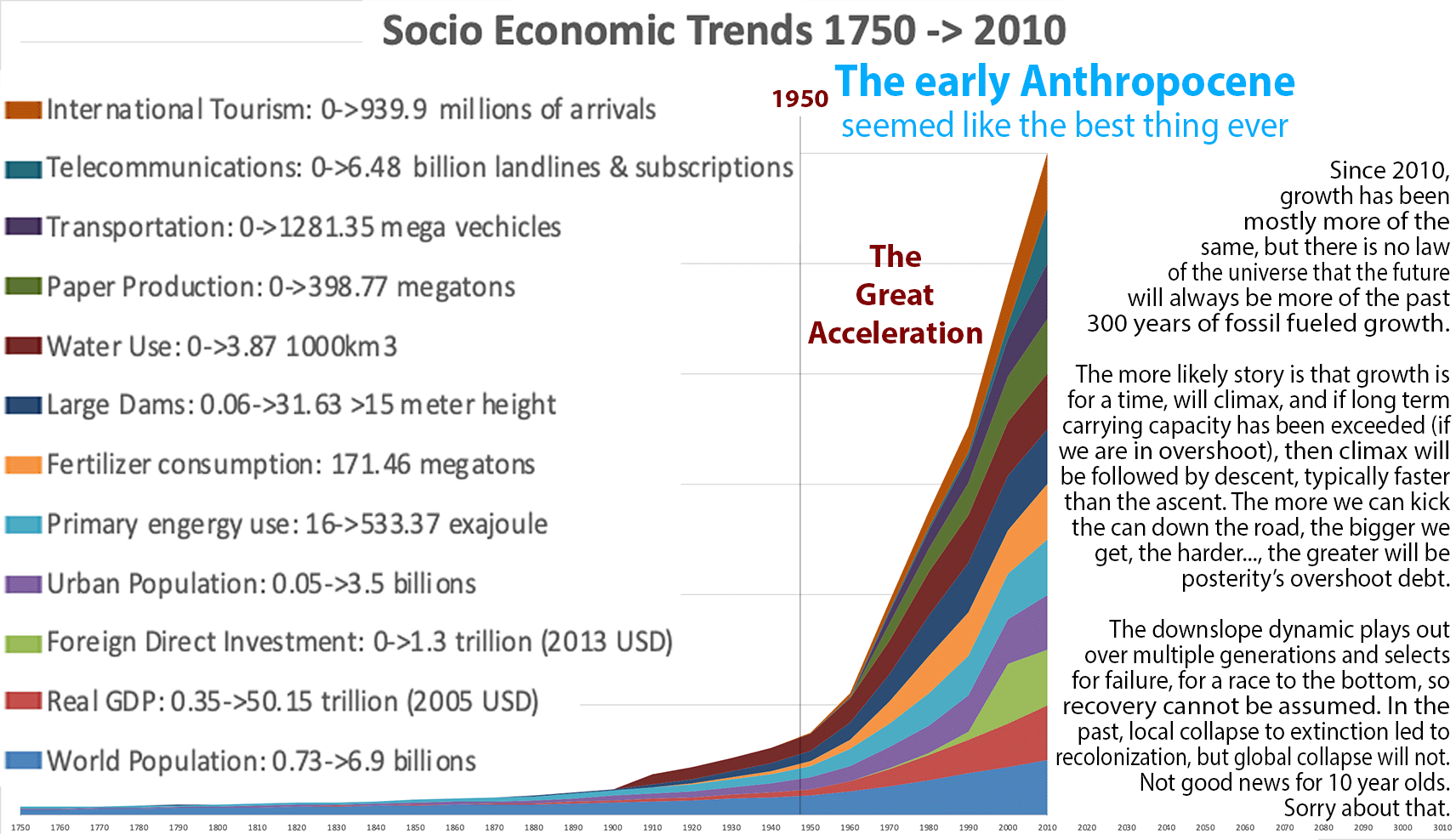
SUBNOTE TO FILE 3/21/23
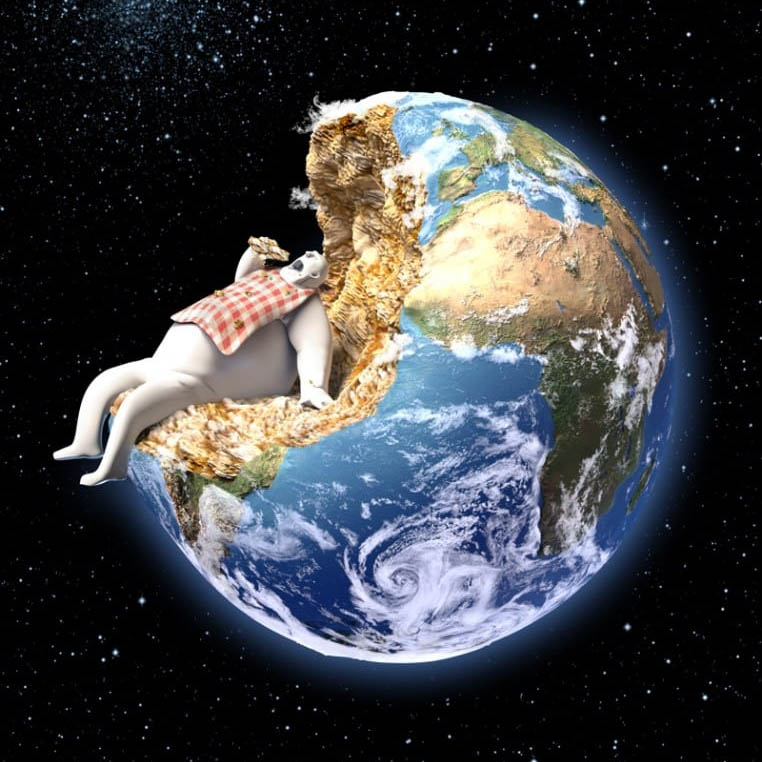
Homo rapacious-expansionist
"...evils that may arise in affairs of state, as in medicine, are easily cured if foreseen at a distance, which only the talented can do. But when, from want of foresight, they are suffered to increase to such a height that they are perceptible to everyone, there is no longer any remedy." -- Niccolo Machiavelli
In the affairs of the expansionist form of human, the outcome could have been foreseen 50k years ago as any astute K-strategist could foresee, could explain the long term wages of short-term self interest, and likely did over and over as the millennia passed as they were being assimilated. Our rapacious expansionism depended on losing our capacity for foresight intelligence.
We are still far from a majority being no longer able to suffer further increase in our mess of fine messes we are incurring, as we are still enthusiastic Anthropocene expansionists likely to double down on what has worked for 50k years unto dissolution. When a majority does foresee (with a deer in the headlights look), our downturn, our transition to the long (200-500 years?) downslope, there will no longer be any remedy.
-----------------------------------------
As noted in a self-published (like mine) article, The Unacknowledged Root Causes of Unsustainability:
It is this industrial revolution that marked humanity’s entrance in the Anthropocene. A new era characterized by unprecedented technological progress and the undisputed domination of earth by the human species. The Anthropocene is a game changer which sees humanity extracting itself from a natural environment which can now be dominated, exploited and transformed to respond to the thirst for more power, wealth, and status.
The Anthropocene will be followed by the great acceleration which in the mid of the 20th century is characterized by a globalisation of our civilisation and a dramatic and exponential surge in human population, technological progress and impact. It is just 20 years after the beginning of the great acceleration that the first planetary overshoot was recorded: from that moment, humanity’s ecological impact will be greater than what earth ecosystems can sustain.
Figure 5: Anthropocene, Great Acceleration and Planetary Overshoot
We as a species have failed to acknowledge the paradigm shift that the Anthropocene is as well as its implications. In this new paradigm in which humans are now the stewards of the earth, the dominant primal survival patterns that have allowed humans to conquer and dominate the surface of the globe are becoming increasingly self destructive and dangerous. This is happening for a simple reason: the current exponential technological progress that we generate amplifies the harmful consequences of our primal survival patterns.
The impulse to dominate and control the environment creates ruthless rivalry for power that generates conflicts that are more and more dangerous in the presence of increasingly powerful weapons of mass destruction.
The impulse to accumulate leads to competition in order to hoard resources which result in growing inequalities and a depletion of natural resources in the presence of decoupled means of extraction in industrial scale.
The impulse to conform to the dominant norms in order to be validated and access social status leads to a marginalisation of difference and a perpetuation of the status quo reinforced by powerful technologies which can be used for mass surveillance and social engineering on a massive scale. The status quo is posing an existential threat when change is a vital need....
[last paragraph]
The global and systemic crisis of sustainability we are facing is nothing less than a call for a collective awakening and expansion of consciousness: an invitation to recognize the interrelation between our inner and outer words. To do so, a proper campaign of awareness about the problem, its hidden root causes and solutions is needed. It would result in a cultural renaissance based on self knowledge, a psychological reorganization and a conscious evolution that would trigger profound changes at all levels, which is exactly what is needed to successfully and safely achieve a global sustainable transition. — Benjamin Casteillo, Jul 15 2022
If I were at an AA type meeting: "Hi, I'm Eric and I'm an expansionist." Yes, and my ancestors have been too, for 50k years (with ongoing assimilation of non-expansionist DNA).
Hard to believe, until your belief in belief addiction is lessened, but for over 6 million year my other hominin ancestors were not expansionists. They spread when selected for by competitive advantage (usually not by premeditated, rapacious conquest/taking). How they could possibly have found their so called lives worth living is beyond me. Did I mention I'm an expansionist?
 Right, so long term this expansionist thing doesn't work, okay I sort of get it, but maybe if my children are less addicted to growth (expansion), and their children's children and so on for 8 to 12 generations (by conscious evolution/selection), then perhaps the dominant form of human on the planet could come to understand it enough to live properly with it such that if an opportunity to expand came (it would), they would foresee the outcome and 'just say no'.
Right, so long term this expansionist thing doesn't work, okay I sort of get it, but maybe if my children are less addicted to growth (expansion), and their children's children and so on for 8 to 12 generations (by conscious evolution/selection), then perhaps the dominant form of human on the planet could come to understand it enough to live properly with it such that if an opportunity to expand came (it would), they would foresee the outcome and 'just say no'.
"There have been seven [climate change] disasters since humans came on the earth, very similar to the one that's just about to happen. I think these events keep separating the wheat from the chaff. And eventually we'll have a human on the planet that really does understand it and can live with it properly [again]. That's the source of my optimism." —James Lovelock
This 'and I'm an expansionist' confession/realization may have to be the starting point of any collective awakening and expansion of consciousness, i.e. Pogo Possum's "We have met the enemy and..."
The claimed beginning of the Anthropocene was preceded by equally questionable claims about human nature and prehistory, claims that may apply to the expansionist form of human that arose 50k-60k years ago, the distal beginning of the Anthropocene and invasive form/culture/civilization whose climax we expansionists having some foresight are beginning to worry about. For a better view I can quote the author: "We can’t solve a problem if we do not understand its nature and scale."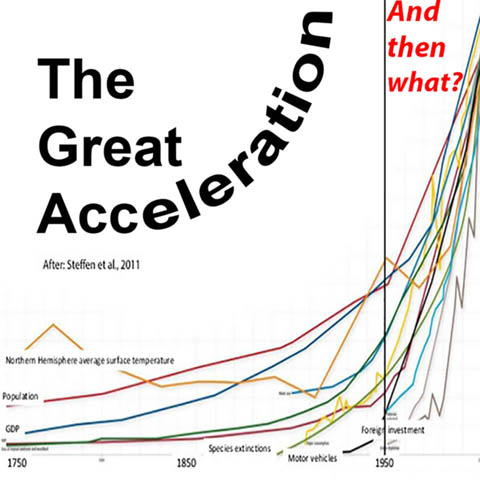
Oh, and the average human was living in some form of empire, from chiefdom to state level, about 3k to 4k years ago when the human population reached and exceeded 35 million, over half of whom were serving empire (as 99.99+% do today including our energy slaves numbering several orders of magnitude more than 8 billion We the People). And add to the story that the exansionist's utter rejection of K-strategy living was the paradigm shift we expansionists fail to acknowledge (for some mind over reality reason, i.e. belief in belief). And with a cup of data in the morning, real solutions that might actually work to renormalize some humans start to look different.
All stories, including mine, are houses of cards. Building on Jell-O or Pixie Dust is to avoid. Each card (claim) is a construct seen through a human mind darkly, if not as wholly imagined, on a foundation of error, ignorance, and illusion. The endeavor to minimize our love of error, ignorance, and illusion (for those who would rather maybe sort of know than firmly believe) is always front and center when building one's just-so stories.
My conjecture is that doing so increases the odds of telling better stories. If overshoot started before storyteller Wackernagel's 1970 date (Earth's not remotely sustainable human population was 3.7 billion), then solving our sustainability crises involves degrowing to 1970 levels. And, sorry, then to pre-1950 levels when the Great Acceleration began (slope averaged >45 degrees). Oh, darn, but the upslope change that was noticeable in one lifetime started with the Industrial Revolution about 1750 (<1 billion humans). [And we may not have 300 years to contract our population and economy post climax (likely 2030-2070 managed or not), so to mitigate a die-off event, a managed birth-off... sorry, that's not Casteillo's story... yet.]
If the Anthropocene actually began over 50k years ago with an expansionist form of human/culture/civilization based on a consensus rejection of the K-strategist way of thinking, seeing, feeling, and living, then Houston we have a bigger problem than all but a very few think, you know, the problem we do not understand, whose nature and scale we wholly (and likely fatally) underestimate (like, you know, maybe we don't quite get the challenge of avoiding a ghastly future).
The number one dominant primal survival instinct for K-strategists is to avoid exceeding carrying capacity (always a bad outcome selected against), which is the 'primal survival instinct' wholly missing from our expansionist human brains/culture (and lists we make). We have lost this most primal of functional behaviors, the necessary prerequisite for our 50k years of success as an techno-invasive species whose overshoot debt posterity will be paying this century (and likely for several centuries to come). Extinction or renormalization are viable outcomes (for the biosphere). Or we become Borg and expand to fill the Milky Way with the wonder of us before spreading forth into a universe of galaxies for the taking.
The paradigm shift that renormalizing would be is from an expansionist form of human/society/culture/civilization to a K-strategist form living within limits as a viable subsystem of Gaia.
"In order to change an existing paradigm you do not struggle to try and change the problematic model. You create a new [to us expansionists] model and make the old one obsolete. That, in essence, is the higher service to which we are all being called." —R. Buckminster Fuller
If I seem like a hyper-viscous junkyard dog barking incessantly, compared to almost everyone else, Casteillo is my twin brother in grime. If I sing a slightly different song off-key and point out differences, it is because I delusionally think my quibbles might matter. Actually, my song is unsingable and unlikeable to perhaps all humans alive today, or likely to be in the near future (next 500 years), so any thought of spreading my narrative (actually Nature's such as I hear Gaia whispering) is error based on ignorance with a topping of illusion. Or I'm wrong again and understanding the difficulty of mitigating posterity's ghastly future (extinction, or worse, as Borg enthusiasts spreading across their first galaxy) is to consider.
SUBNOTE TO FILE 5/5/23 The Anthropocene
A best case outcome
Submitted: For life on Earth the Anthropocene is an existential threat (biodiversity loss and species extinction, i.e. the greatest mass extinction event since the late Cretaceous, one that could rival that the Permian), and that the best outcome would be a highly contagious pandemic that spreads globally, that is 100% fatal to humans (only symptom is sudden death), such that in a year all humans are extinct.
Describe a better (non-human centric) outcome that could be implemented in one year (or a decade, a century, or one millennium) given that the species extinction rate is now one thousand times higher, will be 10k times higher in a century, and perhaps 100k time higher in a millennium than as usual as the epochs pass if modern humans can keep on keeping on.
Yes, Klaatu could come back and remove humans, their technology and ruins in much less time, but an engineered plaque is well within human technology and one billionaire could easily find a few graduate students with enough know-how to make it so. So, tell a better AND as plausible story (e.g. the Hidden Imam could come out of his well and fix our mess of fine messes, but not biophysically likely).
Consider that the Chernobyl Exclusion Zone, an area that covers approximately 2,600 km2 (1,000 sq mi), is the only area on the planet to have shown significant ecological recovery, a dramatic increase in biodiversity, in the last 37 years.
